

SCHOOL-BASED NURSERIES
Could


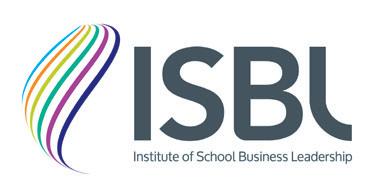



SCHOOL-BASED NURSERIES
Could



Make the most of the summer break by getting your facility ready for the new academic year. From deep cleaning and maintenance, to replacing broken furniture and revamping communal areas, Viking will help you get ahead of the game.
Whether it’s cleaning detergents, classroom furniture, catering supplies, kitchen equipment, or grounds maintenance tools — Viking has it all!
Plan ahead and stock up on:
✓ Disinfectants, cloths, and cleaning fluids – for a thorough deep clean
✓ Hygiene paper, soaps, and sanitary products – all your washrooms essentials
✓ Academic diaries, wall planners, and whiteboards – to organise your team and schedules
Planning a refurbishment? Our professional interior design and furniture service will help you design, plan and install the project - ready for the new term.
Viking is your one-stop shop for:
���� Office stationery and electronics
� Paper, ink, and toner supplies
� Textbooks, classroom essentials, and tech
⚠ Noticeboards, safety signage, and equipment
� First aid kits and PPE
With over 47,000 products online and free next-day delivery, we have everything your education facility needs to wrap up the year!
Get organised today:
���� viking-direct.co.uk/schools-shop
���� 0330 128 1399 to speak to one of our advisors






Mini Maths is an exciting opportunity for Early Years children to further develop basic mathematical concepts within a physical environment. Written by Early Years practitioners for use in larger spaces such as the school hall or gym.
Combine Mini Maths set with our Mini Mats to level up your lessons

Number and dot-value mats feature for subitising skills
The principles of basic mathematics are rooted in numbers, patterns and sequences
Lessons focus on communication, collaborative learning and problem solving















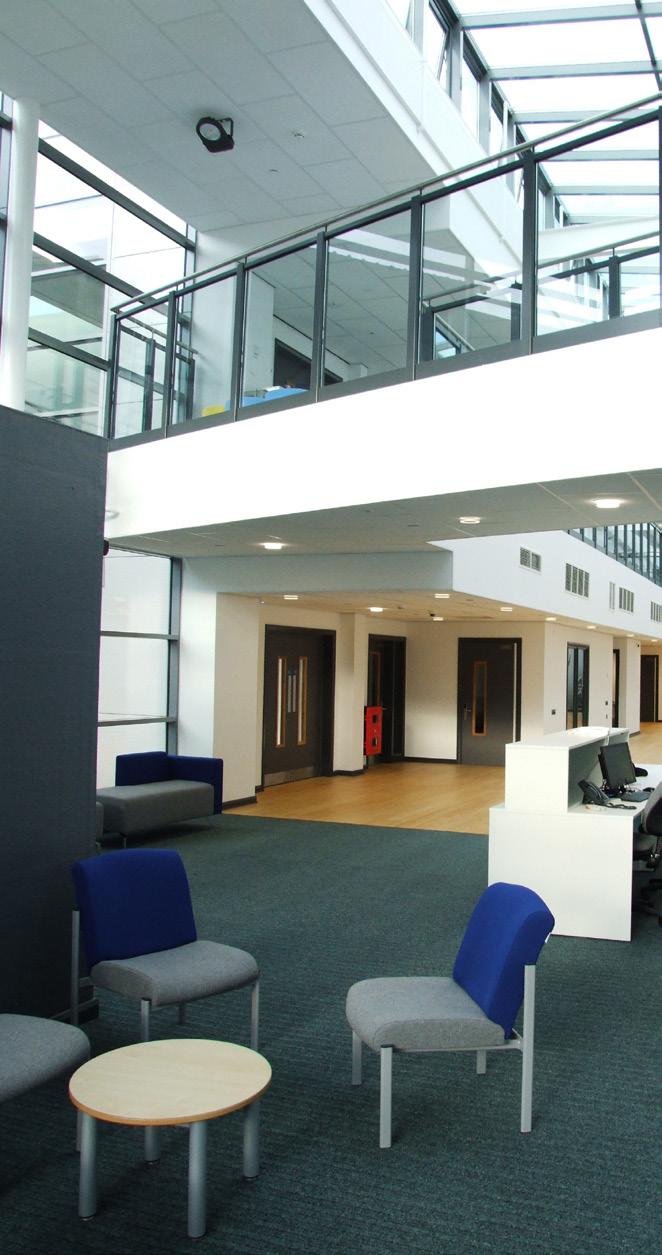


classroom




Ofsted has announced several measures to reassure education providers about the quality of inspectors’ work, as the rollout for the revised framework in November draws closer.
The work of senior inspectors will be quality assured by the national director for education and principal inspector, Lee Owston HMI, following their participation in pilot visits to volunteer settings in early autumn.
Additionally, each inspector will need to complete a comprehensive training programme, with the same quality assurance checks, before being able to carry out a live inspection.
Ofsted says that this will result in fewer inspections than usual in November and December, with all inspections led by the most senior and experienced inspectors. Part-time, external inspectors will be phased in following training, and there will be no inspections in the final week before Christmas break to allow for more training.
In autumn, a random sample of providers will take part in ‘exit interviews’ with His Majesty’s chief inspector, the national director, and senior Ofsted officials to hear about their inspection experience and reflect on the implementation of the reforms. His Majesty’s chief inspector will also invite sector representatives to a series of roundtable meetings to hear their thoughts on the renewed framework...


A new framework has been launched to boost children’s writing skills and improve how writing is taught.
The framework gives teachers guidance to plan high quality lessons and teach writing from reception and throughout primary school, so that thousands more pupils can build strong foundations in language, spelling and handwriting.
This includes integrating writing tasks across all subjects, as well as encouraging children to speak out loud words and sentences before writing them down, and similarly using dictation where children write down words, phrases and sentences a teacher has said.
Even in a digital age, strong writing skills are a vital tool for everyday life and work, helping children explore their thoughts, share their ideas, and make sense of the world around them. Evidence also shows good writing skills can unlock future success and are directly linked to progress in education as well as future earnings.
Building on the success of the government’s reading framework and its focus on phonics teaching, which has seen 100,000 more children every year build strong foundations in reading, the new writing framework is a first step towards transforming how writing is taught.
The launch comes as Key Stage 2 assessment (SATs) results showed the percentage of children meeting the expected standard in writing remains below pre-pandemic levels.
Education Secretary, Bridget Phillipson said: “Far too many children are leaving school...
Ready to improve reading and maths outcomes?
With DreamBox, empower your students to achieve real, measurable progress.
Daisy Education helps students thrive through its online adaptive development programmes:
DreamBox Reading Plus - improves reading, fluency, vocabulary and comprehension.
DreamBox Maths - builds confidence and core maths skills with proven, adaptive learning.

Explore our award-winning programmes, Reading Plus and DreamBox Maths, at no cost - see the impact for yourself!

Suspensions, and particularly abusive behaviour, are on the rise in schools in England, new data from the Department for Education (DfE) reveals.
Figures show that suspensions for persistent disruptive behaviour have risen from 444,676 to 569,921 from 2022-23 to 2023-24, with figures almost quadrupling between 2020-21 (148,416) and 2023-24. Pandemic restrictions are likely to have had an impact on this spike, but the steady incline is still concerning.
The number of suspensions because of physical assault have also seen huge rises, with 141,830 incidents of physical assault against pupils in 2023-24, compared to 123,276 in 2022-23 and 102,408 in 2021-22. For physical assaults against an adult, the figure again continues to climb, with 62,897 incidents in 2023-24, 52,237 in 2022-23, and 38,986 in 2021-22.
Verbal abuse or threatening behaviour has also led to more suspensions, with 45,854 suspensions for verbal abuse or threatening behaviour against a pupil recorded in 202324, 40,388 incidents in 2022-23, and 31,648 in 2021-22. The data shows a stagging 174,063 suspensions for verbal abuse or threatening behaviour against an adult in 2023-24, compared to 148,381 in 2022-23 and 112,615 in 2021-22.
Suspensions from all categories have seen an increase, apart from theft, which had a small decrease in 2023-24 with 6,168 incidents. This is compared to 6,681 in 202223 and 5,352 in 2021-22.
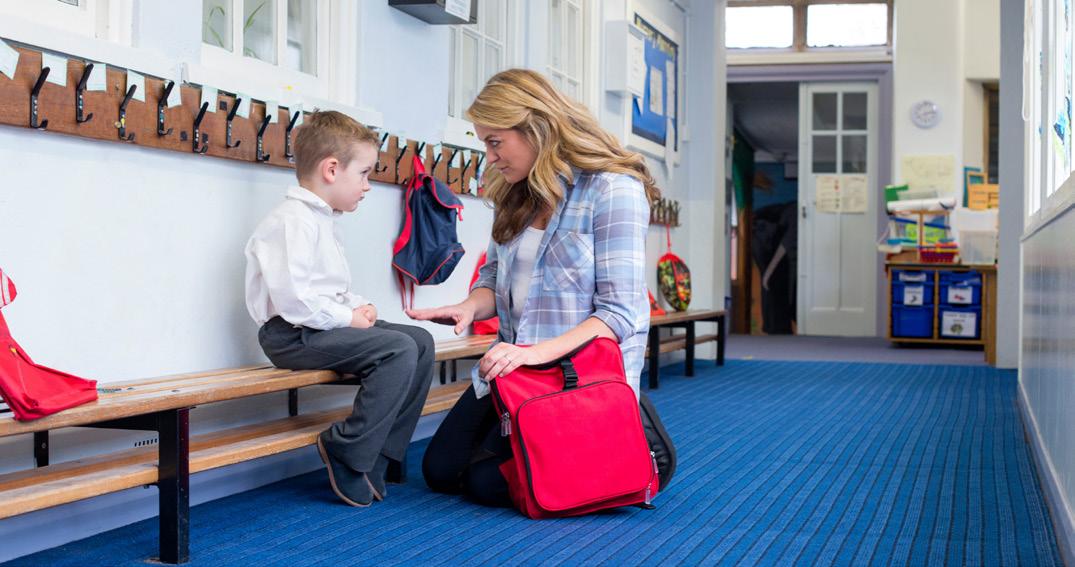

CATERING
Nearly one in two (49 per cent) UK parents feel under-informed about what their children are eating at school, new research from ParentPay Group, in association with LACA – The School Food People, has revealed.
The 2025 School Meals Report, based on feedback from over 236,000 parents across the UK, warns that this lack of information may be impacting meal uptake and fuelling wider health concerns, including childhood obesity.
The findings come at a critical time, as new analysis from the Royal Society for Public Health (RSPH) suggests that in nine areas of England, most children will be overweight or obese by 2035 unless action is taken. The School Meals Report suggests one way forward: better communication between schools, caterers and families.
The report also found a strong parental appetite for food education in schools. Four in five parents (79 per cent) support the introduction of lessons about food, nutrition and origins, either as part of the national curriculum or as an optional series. This highlights public demand for schools to actively support healthy eating habits from a young age.
The lack of communication also appears to be affecting breakfast club participation. While 55 per cent of UK schools offer breakfast provision, a third (33 per cent) of parents said their child doesn’t attend, even when the service is available. One in four (24 per cent) parents didn’t even know if their child’s school provided breakfast options – a gap that schools and caterers must close together...













Ofsted has announced it will be holding a programme of sector engagement events in September to go alongside the final set of education inspection reforms.
The programme of webinars and regional events will continue throughout the autumn term, offering providers a range of opportunities to familiarise themselves with the changes, ahead of inspections under the renewed framework beginning in November.
Ofsted will hold live webinars for different provider types across each education remit, setting out the key changes to inspection. Recordings of each webinar will be available on Ofsted’s YouTube channel afterwards.
There will also be face-to-face and online regional events, hosted by local providers, local authorities and partners. These events will help providers build on their understanding of the renewed framework, supported by published materials. Ofsted will share further details about events in the coming weeks.
His Majesty’s Chief Inspector, Sir Martyn Oliver, said: “I want to reassure education providers that, through our national engagement programme and published materials, they will be able to familiarise themselves with the changes during the first part of the autumn term – while routine school and further education and skills inspections are on hold.
“Our Inspectors will all receive extensive training between now and November, and many will have had the experience of a full pilot inspection. I know there are some concerns about the timeline for these changes, that’s why we are planning such a comprehensive programme. I have every confidence that our approach will support a successful roll-out of new-look inspections in November.”


There’s a new national momentum building around EdTech, driven in no small part by the sometimes nauseating speed of AI development. We’ve seen good movement on content , guidance , evidence , test-bedding , strategy , and inspection , among other things.
But, beneath those efforts sits a quieter conversation: how AI might support the scaffolding around teaching and learning. That could include everything going from calendars, payroll, asset management, procurement, reportingall the parts of school life rarely discussed at EdTech conferences, but that are essential to making anything work.
That’s the space the AI in Education COO Panel is exploring. Not sweeping visions, but the everyday tasks that can – and should – be streamlined by AI: where admin can be automated, where systems talk past each other, and where tech might relieve pressure.
We are also reflecting that same mission at techUK, as we explore how school operations could offer the most practical, low-risk environment to build AI capability. Could operational testbeds prove effective in freeing up time, resource, and confidence to take on the more complex challenges in AI?
Streamlining the everyday through smart, quiet innovation can lay the groundwork for broader, more ambitious transformation, building trust and capacity along the way.

www.techuk.org
We’re helping over 3,000 schools achieve their energy, carbon and cost-saving goals. Our expertise, your advantage. Supporting sustainability champions like you.

Contact us hello@zenergi.co.uk zenergi.co.uk
Contact a Zenergi expert today




A new panel of young people with experience of being out of education, employment and training will be formed to help shape employment and careers guidance policy.
The Youth Guarantee Advisory Panel, made up of 17 young people aged 18 to 24, will regularly meet to discuss the biggest barriers they face to building their careers and advise what can be done to break these down.
It comes as the latest data shows one in eight young people are currently not in education, employment or training – demonstrating the urgent need for reform.
Early insight from the panel has found that some of the most significant obstacles include mental health challenges and an overemphasis in school on UCAS applications instead of tailored careers advice, including alternative options like apprenticeships and training. Lack of public transport and access to digital tools and devices have also been raised as barriers.
All views shared in the panel meetings will go on to inform policy to ensure that the Youth Guarantee best serves young people.
Work and Pensions Secretary Liz Kendall said: “Young people know better than anyone the challenges they face – and the support they need to succeed.”
“That’s why their voices will shape how we will deliver a Youth Guarantee that truly works, opening up real opportunities for every 18-to-21year-old to be in work, training or education.”...
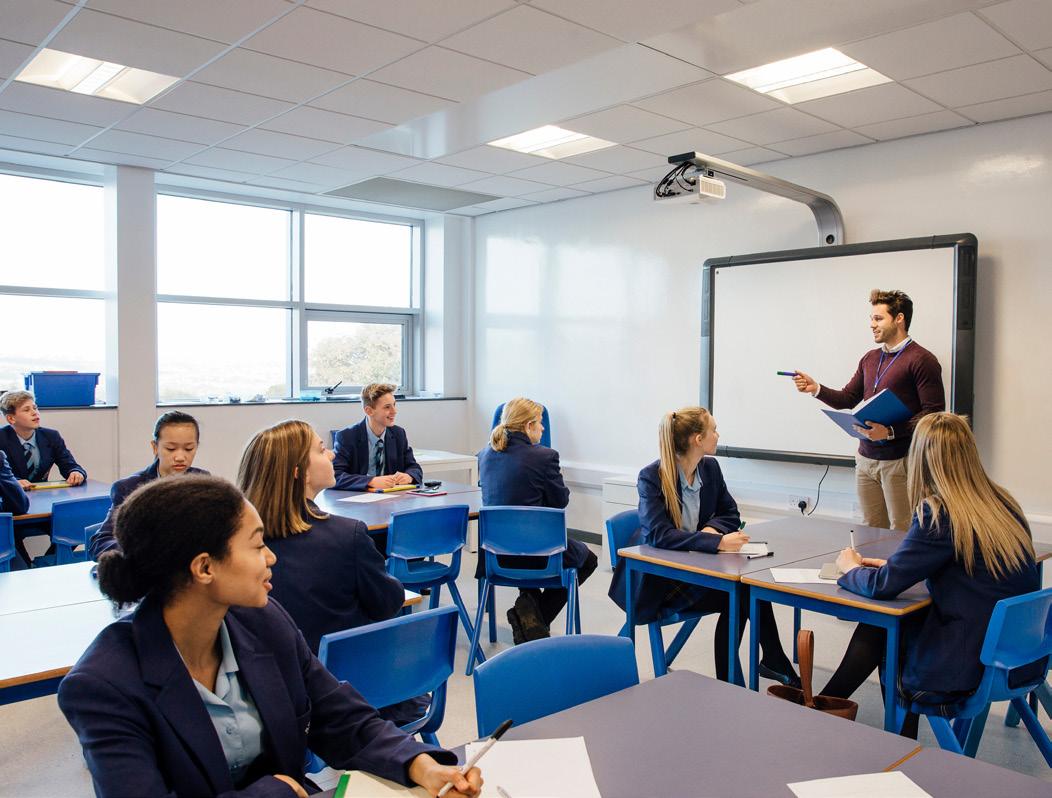
Better Futures Fund to support vulnerable children: READ MORE
Social care failings affecting education engagement: READ MORE
Teacher recruitment pledge lacks clarity : READ MORE
Effective inclusion practice in mainstream schools revealed: READ MORE
Charity calls for a free code club in every school: READ MORE
A new initiative will see primary school children becoming junior active travel inspectors, with a new mission to help more kids cycle, walk, wheel, and scoot to schools.
The scheme will see children audit their school run on a new ‘kid-friendly app’ to boost health and safety, while reducing road congestion. It gives pupils the chance to shape their own travel to school, helping all children access safer, greener and more accessible walking and cycling routes to school.
This comes as data found that around 40 per cent of primary school children and 25 per cent of secondary school pupils are currently driven to school and school drop-offs account for a quarter of morning rush hour traffic in London, and even more elsewhere in the country.
Participating schools will recruit a team of junior active travel inspectors, who will work with teachers and parents to assess local walking and cycling routes around their schools. This data will be used to identify barriers to healthier journeys and suggest ideas to encourage more active and safer journeys.
Modeshift STARS, the junior active travel inspectors will then report on areas for improvement using a bespoke, child-friendly version of ATE’s inspection checklist. This follows the government’s commitment over the next four years for active travel in the Spending Review, as well as £300 million...
Tatum, Brick Club learner, aged 8
We’re Play Included, the world’s leading LEGO® therapy experts. We train educators to deliver Brick Clubs – specialist workshops that unlock every child’s growth through play. Our programme is backed by the LEGO Foundation and delivers proven social and emotional outcomes. The modules are fun, easy to follow and equip teachers, TAs and
SENCOs with the tools to build children’s confidence, communication skills and their sense of belonging.
With bespoke packages and group discounts to fit your budget, isn’t it time your school got an OMG review?
Let’s connect! Click to arrange a call to learn about our packages
At Play Included, we specialise in helping educators unlock children’s potential through play. As pioneers of LEGO® therapy, we deliver the world-renowned Brick-by-Brick® programme – endorsed by the LEGO Foundation and grounded in psychological research


The Brick-by-Brick® programme is designed to foster social and emotional growth. Our training equips educators to run specialist Brick Clubs that are as effective as they are fun. These sessions offer children a space to explore creativity while building communication and teamwork skills.
“Play Included®’s Brick-by-Brick® programme is such a useful tool to aid a wide range of children who need additional support with their communication skills. It also provides a safe space for children to feel included, grow in confidence and develop friendships,” commented Kirsten Lamb from The Donaldson Trust.
The key benefits of the Brick-by-Brick® programme include collaborative play, where children work on collaborative LEGO building activities, fostering teamwork and problem-solving. Social skill development is another benefit, as activities encourage communication, from giving instructions to sharing ideas.
Children also experience tailored learning, as flexible sessions adapt to the needs of
every child, including advanced options like stop-motion animation and LEGO coding.
The programme also has lasting impact, with many children discovering newfound confidence and creating friendships that extend beyond the programme.
“Before Brick Club, I used to feel quite nervous, now I’m much more confident talking to peers,” commented Allan, age 11.
Play Included benefits from trusted expertise – founded by one of the original creators of LEGO therapy, our work is rooted in years of proven results.
It is also the only LEGO therapy programme supported by the LEGO Foundation.
The programme also benefits from research-driven solutions where evidencebased approaches ensure measurable improvements in children’s communication, collaboration, and emotional wellbeing.
What’s more, the programme is tailored to meet the needs of educational institutions.
Whether you prefer in-person workshops or online sessions, our expert-led courses are interactive and packed with actionable strategies. With bespoke options and group packages available, we work with your team to deliver impactful results.
“I could see that Brick Club would help the students in my class who needed support to manage their anxiety, relationships, and interactions with one another. The training is so well structured and the resources are excellent. The children have furthered their social development thanks to Brick Club,” said Suzi Telford, Teacher, Belleville Primary School. M
Create a warm, welcoming and stimulating learning space with our beautiful nursery school furniture. Designed specifically for early years settings, our furniture blends safety, functionality and fun to support every child’s development. From child-sized tables and chairs to cosy reading nooks, creative play stations, and smart storage solutions – every item is built to last and crafted with care.
All our products are made from high-quality, nontoxic materials and feature smooth, rounded edges for maximum safety. With a wide variety of vibrant colours and modern designs, you can create a visually engaging environment that encourages imagination, exploration, and social interaction.
Whether you’re setting up a new nursery or upgrading an existing space, we offer flexible, modular options to suit your layout and budget. Our furniture is easy to clean, eco-friendly, and designed to meet the highest standards of comfort and durability for active little learners.



Let us help you bring your ideal learning space to life – one that supports creativity, independence and the joy of learning
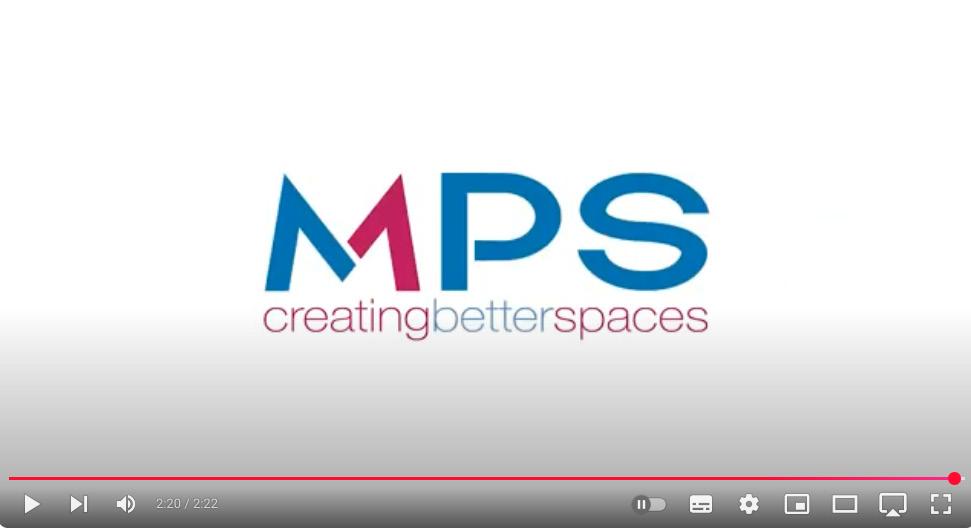






Thousands of new early years places are launching in primary schools this September under a £37 million government scheme. With the next phase of the scheme set to launch in the Autumn, should your school get involved?
The landscape of early years education in England is undergoing a change. This September, over 4,000 new nursery places will open within state-funded primary schools as part of the government’s flagship school-based nursery programme – a key part of Labour’s “Plan for Change.”
With nearly 200 schools already exceeding place targets, many school leaders are increasingly viewing early years provision not only as a way to serve their communities but also as a strategic part of whole-school improvement.
A policy with momentum
Originally a manifesto pledge, Labour’s commitment to open 3,000 new schoolbased nurseries is now in motion. Following a £15 million capital funding round last autumn, 300 primary schools were selected for the first wave of implementation, with an average of 20 places each.
The government has since more than doubled the pot, announcing an additional £37 million to support future phases of the scheme, with the next wave of expansions set to begin this autumn. E

At Smudge & Dribble Ltd, we specialise in hygiene, cleaning, and baby changing supplies for the education sector.
From seamlessly changing nappies to keeping tiny hands as clean and germ-free as possible, it’s important to create a safe and hygienic environment – where children can learn, explore and thrive with confidence. And here at Smudge and Dribble, we’re here to help. With an extensive range of trusted brands, child-friendly products and practical solutions, we can provide the ideal childcare supplies for your nursery or school.
As a proud family-run business with over three decades of experience, our happy, friendly team is here to help with reliable next day delivery service, as standard.




F This scheme will help increase capacity ahead of September 2025’s roll out of 30 hours of government funded childcare per week, as government projections show that around half of local areas need to increase their capacity by between 10 and 20 per cent to meet demand. Some need an uplift of more than 20 per cent – with areas that see traditionally lower household incomes including Northumberland, Plymouth and Rotherham, all in this group.
One of the aims of the initiative is to tackle the growing gap in school readiness.
According to Kindred’s 2024 School Readiness Survey, nearly one in three Reception-aged children struggle to communicate basic needs. A quarter lack foundational language skills. To counter this, more investment in good quality early years education is needed.
Co-locating early years education within primary schools enables stronger collaboration between nursery and Reception staff. It means teachers can track development early, identify SEND needs sooner, and ensure continuity of care and learning. For children, that results in smoother transitions and better outcomes.
“Being based on a school site means children can settle in early, build confidence, and feel ready for the step into Reception,” said Wayne Wathen-Howell, readteacher at Minet Infant and Nursery School in Hayes, one of the nearly 200 schools opening new places this September. “It’s a big moment for our community.” E

Key considerations before applying for funding include an assessment of whether the school has underused space that could be converted for nursery use, and whether there is parental demand for childcare places

F The programme is also a step forward in accessibility to childcare for parents. With childcare costs cited as a key barrier for working parents – especially in disadvantaged areas – this programme promises savings of up to £7,500 per year when paired with the government’s 30-hours free childcare offer.
Parents are also drawn to the convenience of collecting siblings from one site and the reassurance of continuity as their child progresses from nursery through to Year 6.
For schools, offering early years provision can boost engagement with families, enhance community reputation, and, critically, support enrolment in Reception and beyond.
This also presents a leadership opportunity. Headteachers will be tasked with overseeing the integration of early years staff, ensuring alignment with whole-school values
and curriculum goals, and making best use of existing space and resources.
However, school leaders must be prepared. Early years settings require a specific skill set and regulatory oversight, and integration with the wider school must be handled thoughtfully.
Alex Armstrong, headteacher at Bloemfontein Primary School who will be using their allocated funding to open a new baby room on site said: “This funding will enable us to transform unused school space into an engaging and vibrant environment, offering year-round childcare for children from birth to five.
“There are so many benefits to schoolbased nursery provision, including continuity for children and their families and the opportunity to develop expert-led learning which will provide our children with strong foundations for lifelong success.”

With the next phase of funding set to open this autumn, now is the time for headteachers to assess whether they want to participate in the scheme.
If so, key considerations include an assessment of facilities – does the school have adaptable or underused space that could be converted for nursery use? And staffing – can the school attract or retain qualified early years professionals?
Parental demand is also key and schools should find out if there is there appetite in their local area for expanded provision.
Schools should work closely with local authorities to outline how proposals will respond to local need and subsequently contribute to the government’s plan for an early years system that breaks down barriers to opportunity for children across the country.
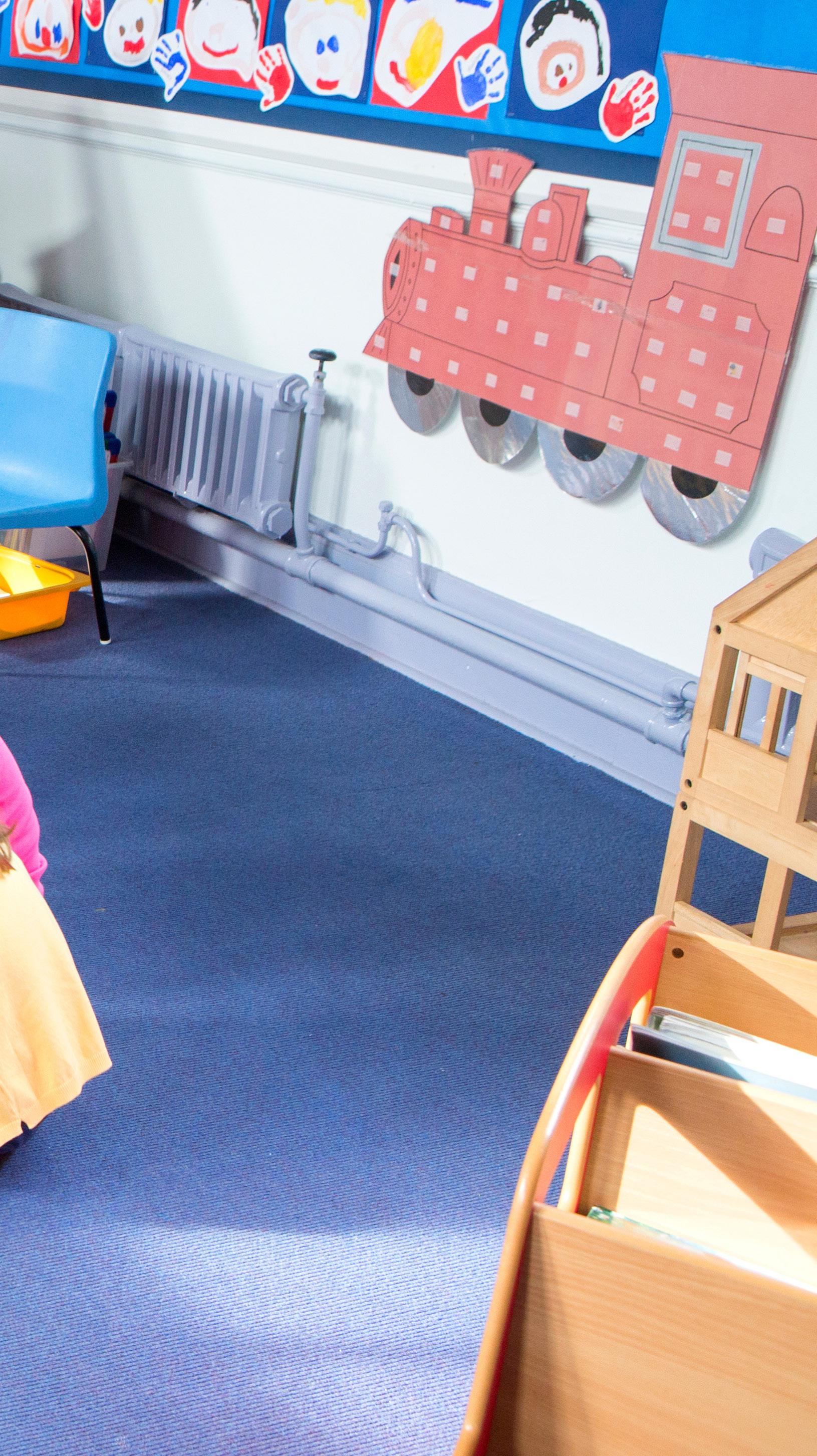

Schools can now have a more central role in early years education. For headteachers, this can be a good an opportunity to help shape a system where all children are school-ready, and all families feel supported from the very start
Schools can now have a more central role in early years education. For headteachers, this can be a good an opportunity to help shape a system where all children are school-ready, and all families feel supported from the very start.
Jason Elsom, chief executive of Parentkind said: “Some of the best performing schools are now expanding into early years to deliver an excellent education, and the School-Based Nursery Capital Grant will enable even more schools to help the children in their care to be school ready before moving from nursery to reception, giving them the best start in life.”
Education Secretary Bridget Phillipson said: “This September is only the beginning. This government has a clear Plan for Change to get tens of thousands more children school ready each year so that every child, from any background, gets the opportunities they need to get on in life.” M



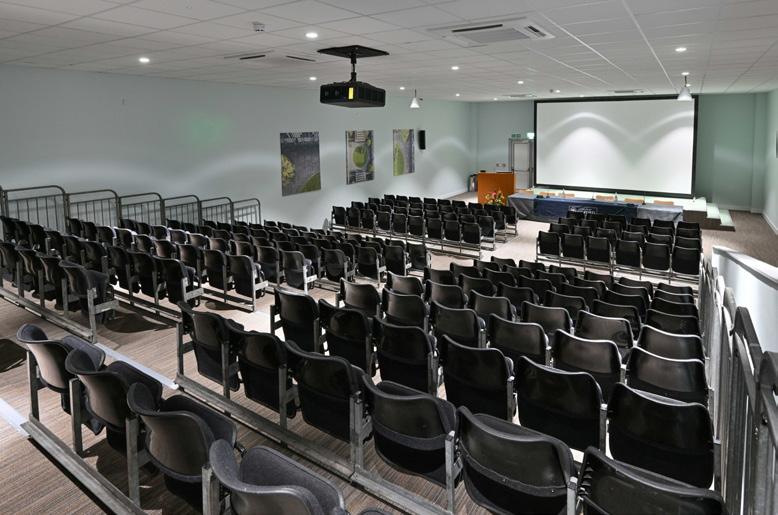



As schools face pressures from overcrowding, aging infrastructure and safety concerns, the need for smarter construction solutions is high. Richard Hipkiss from the Modular and Portable Building Association, explores how volumetric modular construction is helping schools meet immediate needs while delivering learning environments for the future
As schools, academies and colleges across the country grapple with overcrowding, aging buildings, and critical structural issues like those caused by reinforced autoclaved aerated concrete (RAAC) – the urgency for smarter, faster construction solutions has never been greater.
In the face of these mounting pressures, how can industrialised construction revolutionise the education sector – delivering rapid, safe and sustainable spaces fit for 21st century learning?
The MPBA represents the leading innovators across the modular construction supply chain, championing a smarter, more industrialised approach to building for the education sector. Volumetric modular construction is far more than a stopgap for emergencies or short-term
fixes – it is a transformative, future-ready solution with the power to redefine how we design, build and experience education spaces.
One of the standout advantages of volumetric modular construction is its unrivalled speed. Traditional building methods are often at the mercy of weather, subcontractor delays and onsite complexities. In contrast, modular buildings are manufactured in controlled factory environments with precision and consistency. Components – including floors, walls, ceilings, M&E systems and internal finishes – are produced simultaneously with site preparation, significantly accelerating project timelines. E







Factory-based
construction is significantly more resourceefficient than traditional builds. Waste is minimised through controlled processes, precision cutting and the reuse of materials

F According to RICS (Royal Institution of Chartered Surveyors) – this parallel workflow allows education providers to benefit from up to 50 per cent faster delivery compared to conventional methods. This is especially critical for schools facing immediate accommodation needs due to rising enrolment figures or emergency scenarios linked to structural safety concerns like RAAC.
For example, when schools are found to contain unsafe RAAC panels, teaching spaces may need to be vacated immediately. In such cases, MPBA members have successfully delivered temporary classrooms and replacement facilities within just weeks – ensuring minimal disruption for teaching staff and students.
Equally, modular construction’s rapid turnaround is advantageous for capital development programmes, particularly those aligned with the Department for Education’s (DfE) fast-track frameworks. Schools can avoid long periods of construction disruption and benefit from modern facilities far sooner than traditional builds would allow.
A cornerstone of industrialised construction, the controlled factory environment significantly enhances the safety credentials of modular building. By shifting the majority of the construction process offsite, risks are minimised – not only for the workforce but also within sensitive educational settings, where safeguarding students and staff is critical.
This streamlined, precision-driven approach embodies the core principles of industrialised construction: consistency, control and uncompromising safety. On traditional building sites, high footfall, machinery and material handling present a range of hazards. E



In an emergency, every second counts. Defender Swiftlock is a simple yet highly effective lockdown tool designed to secure any lever-handled door in seconds. No keys, no complex mechanisms just a quick and easy press-and-slide action to prevent unauthorised access.
✔ Instant Lockdown – Quickly secure classrooms and offices in emergencies
✔ No Installation Hassle – Simply stick and secure, no professional fitting required
✔ Universal Fit – Works on all internal lever-handled doors
✔ Trusted by Schools Across the UK – A proven tool in lockdown procedures
✔ Affordable Protection – Twin pack for just £7 95





energy efficiency in mind. High-performance insulation, airtight construction and integrated renewable technologies – such as solar PV and heat pumps – can all be incorporated at the manufacturing stage. This leads to improved thermal performance and reduced running costs for schools – an increasingly important consideration given budgetary constraints across the sector.
Furthermore, the modular approach facilitates whole-life sustainability. Modular buildings can be demounted, relocated, reconfigured or expanded with minimal environmental impact. This adaptability ensures that school estates remain flexible and future-proof without the need for carbonintensive demolition and rebuild cycles.
Crucially, modular construction embraces the principles of circular construction. Buildings are designed for disassembly, enabling components and modules to be taken apart without damage and reused elsewhere – extending the life of materials and reducing demand for primary resources. This design-for-reuse approach not only cuts down on waste but also allows for a more efficient and regenerative building lifecycle. By embedding circularity into the design and delivery of educational spaces, modular construction aligns with a sustainable, long-term vision for the built environment. E
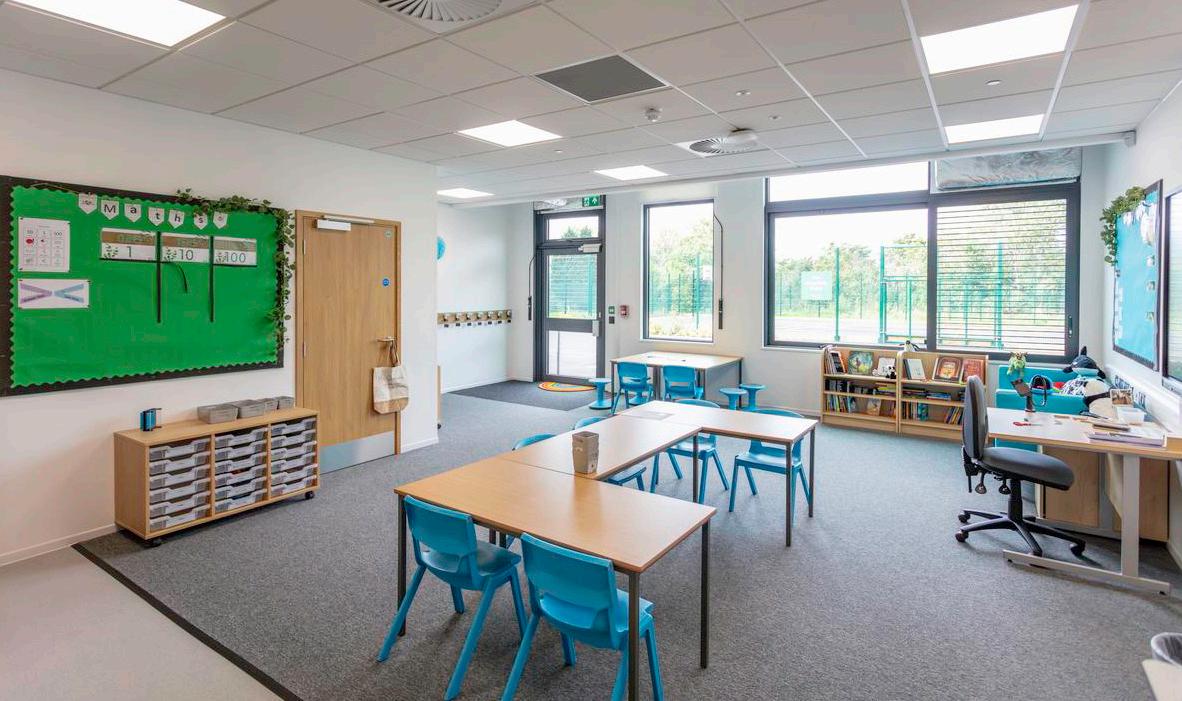



The needs of the education sector are changing. Learning environments must be fit for purpose and also adaptable, inspiring and inclusive. Volumetric modular construction enables architects and school leaders to reimagine spaces with creativity and agility. Whether it is a science lab, a multi-classroom block, a SEN support hub, or a temporary portable facility, modular design can be tailored to suit specific teaching and operational needs. Acoustic specifications, lighting strategies, ventilation systems and accessibility features can all be incorporated from the outset in a factory controlled environment.
In addition, because modules are preengineered and manufactured offsite, the design process benefits from repeatability and standardisation – without compromising on customisation. Schools can have bespoke facilities delivered at scale and pace, often drawing on a library of pre-approved designs that meet DfE standards for space, compliance and building performance. The modular approach offers a scalable, replicable model for deploying consistent quality across multiple school sites.
As the education sector continues to evolve in the face of demographic growth, funding pressures and estate renewal – volumetric modular construction provides a valuable toolkit for planners, designers and school leaders. The method is well aligned with a range of national programmes, including
the School Rebuilding Programme (SRP), with modular options often preferred for their speed and cost certainty.
It also works well for emergency RAAC response measures, rapidily deploying temporary classrooms to maintain learning continuity. Modular construction also helps basic needs and SEN expansion, giving flexible delivery of permanent or semi-permanent buildings to meet urgent pupil place requirements. What’s more, modular construction can help with summer holiday programmes as it allows for installations during short holiday windows, avoiding term-time disruption.
At MPBA, we work closely with government, industry bodies and procurement frameworks to ensure our members deliver high-quality, fully compliant education buildings that meet both immediate needs and long-term goals.
The education sector faces a dual challenge. Creating inspiring, sustainable learning environments whilst managing tight budgets and urgent timelines. Volumetric modular construction meets this challenge – offering speed, safety, quality, and sustainability in one forward-thinking solution.
As the sector tackles rising demand, outdated infrastructure and the urgent need for Net Zero progress, modular methods provide a smarter, faster, and greener path forward. M
Leading offsite manufacturing specialist McAvoy has started the next phase of expansion at Oasis Academy Temple Quarter’s temporary school in Bristol, adding a third storey and a new single-storey building

McAvoy’s SmartClass® rental solution will deliver additional high-quality teaching spaces on the new third-storey, alongside a new single-storey dining area extension. This expansion will accommodate an increase in pupil intake in 2025/2026, serving as a vital interim solution until the Academy’s permanent school is constructed.
This latest phase of work follows on from McAvoy’s recent completion of the school’s ground floor in 2023 and first storey in 2024, which included additional classrooms, staff areas, offices, toilet facilities, storerooms, and medical rooms. All works have been designed by McAvoy to align with the Department for Education’s ‘Be Lean, Be Clean, Be Green’ hierarchy and incorporating energy-efficient lighting, natural ventilation, and methods designed to reduce waste.
Oliver Egan, contracts manager at McAvoy said: “We have been working with Oasis Academy Temple Quarter since 2023 to provide high-quality temporary education facilities which have enabled the school to open, and subsequently grow, in line with admissions
while construction on its permanent school takes place. Our innovative rental offering is a dynamic, cost-effective route for education providers to create the adaptable learning environments they need at pace. The flexibility of McAvoy’s SmartClass® rental solution also means that when they are no longer needed by the school, the buildings can be sustainably removed, repurposed and reused.”
Richard James, head of school at Oasis Academy Temple Quarter, said: “The temporary school facility and ongoing expansion works has proven to be a highly effective solution for Oasis Academy Temple Quarter as we strive to ensure pupils have the best facilities and teaching can continue. We are really pleased with how the team at McAvoy have been able to quickly and efficiently navigate our continued expansion needs around our teaching and learning requirements.”
McAvoy will complete the installation of the planned third phase of works around the school’s holiday dates to ensure there is no disruption to teaching. Completion will coincide with the new school year pupil intake in September 2025. M
For more information about McAvoy’s temporary modular solutions, visit www.mcavoygroup.com/what-we-do/ temporary/

“ “
Evolution Doors is a Norfolk based manufacturer, supplier and installer of high-performance fire doors and passive fire protection solutions. With a mission to combine innovation, compliance, and community education, the company is dedicated to protection lives and raising awareness of fire safety standards nationwide.
We are excited to announce the creation of our new book: The Adventures of the Brave Fire Door.
As most of you know, we manufacture fire doors and install them within Educational facilities. Each year brings new challenges, goals and ideas however the team, on site and at our HQ, bring their best standards of working to push the company forward.
This year we have entered a completely different and surprising chapter.
A good friend and colleague of the business Jamie McKerrow Maxwell created a new little mascot to add to the team. This little guy got the creative cogs moving within the team resulting in the design, illustration and decision to publish our own children’s book. The books subject matter is very close to our hearts, highlighting the importance of fire safety and fire doors within schools, with our little new team member leading the way throughout the story.

We need YOUR help to name our new team member

*The winning name wins a set of personalised copies of ‘The Adventures of The Brave Fire

Here at Evolution our team of skilled individuals range from specialising in Fire protection through compartmentation to fire door manufacture and installation. Over the years we have grouped together fully trained carpenters who have a particular strength in their field. These guys make sure all of your fire protection needs are completed to the highest standard. We have a thorough surveying system run by individuals who have an eye for spotting and addressing non conformities in your existing or absent fire protection system.
Our services include:
•Surveying with a comprehensive report service
•Project Management
•Fire Door Manufacturing
•Fire Door Installation
•Fire Door Maintenance
•Fire Stopping
•Fire Alarm & Access Control



We need your school, trust or business to help us find a name for our new member of the team. We are open to all ideas but remember that his role is within the fire safety sector, we want you to get super creative!
How to Enter -
Visit our webstite and fill out our entry form: https://www.evolution-bs.co.uk/contact-8
With £740 million in new capital funding, the government is taking a major step toward transforming SEND provision in schools, enabling more children to learn in inclusive, supportive environments close to home. So how can the funding be used?
The government has announced a £740 million capital investment to fund 10,000 new school places for children with Special Educational Needs and Disabilities (SEND). With a critical focus on inclusivity and local access, the initiative aims to deliver adaptations, expand specialist units in mainstream schools, as well as create new places in special schools – delivering on the government’s wider Plan for Change.
For school leaders, local authorities, and educational strategists, this announcement marks a pivotal opportunity to reshape the landscape of support for SEND pupils. The funding aims to address historic under-provision, reduce reliance on distant independent special schools, and build sustainable, inclusive environments closer to home.

Fewer than one in 10 mainstream schools currently host a specialist SEN unit or resourced provision, which is specialist facilities which provide more intensive support for pupils with SEND. Between 2010 to 2024, the number of children with Education, Health and Care Plans (EHCPs) educated in independent special schools skyrocketed from 7,000 to 26,000. Meanwhile, a recent deficit of 8,000 places in state special schools underscores the urgency for more provision.
Analysis suggests that at least 15,000 more children could benefit from appropriate resourced provision in mainstream settings if capacity were increased.
The newly announced funding will support the creation of adaptable, inclusive spaces, such as sensory breakout rooms and the integration of assistive technologies – to better meet diverse learner needs within existing school communities.
Education Secretary Bridget Phillipson called the funding “a big step towards delivering not only enough school places, but the right school

The funding will support the creation of adaptable, inclusive spaces, such as sensory breakout rooms, and the integration of assistive technologies – to better meet diverse learner needs within existing school communities
places.” She emphasised that this is part of a broader mission to “break the link between background and opportunity” and ensure no child is left behind due to shortfalls in provision.
Barking and Dagenham is already a blueprint for what can be achieved. The area had a shortage of specialist classrooms in local mainstream schools for pupils with SEND, forcing them to attend schools far from home for the right support. Over the past decade, the London borough has expanded specialist classroom provision. Today, nearly half of all schools in the area have integrated resourced provisions, allowing pupils to stay within their communities and access education alongside their peers.
Marie Ziane, headteacher at Becontree Primary School, highlights the transformational impact of capital investment. She said: “At Becontree Primary School, all of our work stems from a shared belief and understanding that all children have learning, well-being and safeguarding needs.
“Capital funding, alongside support from the Local Authority, has been an essential part of realising our school’s vision for truly inclusive practice.
“The modification and creative use of existing spaces has had a significant impact on the learning, engagement and integration of children with Autism who attend our Additional Resource Provision, as well as having a huge impact on the learning and understanding of all members of our school community.”
Further north, Iveson Primary School in Leeds has integrated The Aviary, a resourced provision that blends mainstream learning with tailored SEND support. Headteacher Hayley Marshall explains: “Opening The Aviary, a resourced provision, at Iveson Primary has had a significant positive impact for the whole school community, enabling us to provide E

F specialist facilities with a high-quality, adapted curriculum for pupils with SEND, alongside our mainstream provision. This fosters integration and inclusion and supports children to thrive and feel confident in school alongside their peers.
“Adapted to suit individual pupils’ needs and interests, provision in The Aviary includes life skills and social skills and enables children to access mainstream classes while also receiving specialist support. Parents welcome the flexibility of the provision and the positive impact this has had on their children’s social, emotional and academic progress.”
Parental advocacy groups have welcomed the funding, while underscoring the need for meaningful collaboration in implementation. Sarah Clarke and Jo Harrison, co-chairs of the National Network of Parent Carer Forums, said: “For too long, families have faced limited options and long waits for appropriate support. Creating more inclusive environments –where children and young people with special educational needs can thrive alongside their peers – is a positive step forward.”
Amanda Allard, director at the Council for Disabled Children, echoed this sentiment: “We welcome the announcement on how this investment can be used and the focus on Local Authorities supporting schools to ensure that disabled children and young people, and those with special educational needs, can have their needs met in inclusive local schools.
“We know from our work with local areas, and through the What Works in SEND programme, that there is some very effective practice across the country, and we encourage local areas to share and learn from this as they develop inclusive provision which enables children and young people to learn, develop friendships and be part of their community.”
School leaders now face the task of translating funding into practice. That means not only adapting physical environments, but fostering a culture of inclusivity through staff training, curriculum development, and engagement with families.
The Department for Education has published new guidance to support local authorities in using this funding to maximise inclusion in mainstream settings. L
nasen’s ninth annual awards are on the horizon! These prestigious awards shine a spotlight on the settings and individuals who are working tirelessly to create a more inclusive future for children and young people with special educational needs and disabilities (SEND)

This year, we received over 440 nominations from across the UK, each one a testament to the passion, innovation and commitment driving inclusive practice. Our expert panel of judges is currently hard at work shortlisting across 18 award categories, and the results are nearly in.
Those who are shortlisted will receive an exclusive invitation to join us at the awards ceremony on Friday 3rd October 2025 at The Vox, Birmingham, where the winners will be announced in front of peers, professionals and fellow changemakers.
An evening to remember
Alongside the awards, guests will enjoy a three-course meal and live entertainment along with a raffle to support the nasen charity, making this not just a celebration, but a truly memorable evening.
The nasen Awards is more than an event, it’s an inspiring evening of recognition, reflection, and connection. You’ll hear powerful stories of impact from across the UK, meet fellow advocates for inclusion, and become part of a national movement supporting SEND excellence.
The awards bring together educators, school leaders, SEND Coordinators (SENCOs), support services, charities and inclusion champions. Whether you’re part of a nominated organisation or simply passionate about inclusive education, this is the perfect opportunity to build relationships, share ideas, and be part of something bigger.
Tickets are now on sale at £150 + VAT, and we’d love to welcome you.
Find out more about the awards and book your tickets today: https://nasen.org.uk/ events/nasen-awards-2025.
Want to get your brand seen by leading figures in the SEND/education sector? We have a range of sponsorship opportunities available, please contact Alistair Gilbert to discuss, AlistairG@ nasen.org.uk or visit: https://nasen.org.uk/ page/nasen-awards-sponsors M
INFORMATION
Read more on the awards. Read more for sponsors.

With energy bills soaring and the race to net zero intensifying, schools are turning to solar power as a practical, high-impact solution. Sue Wheat from Let’s Go Zero explores how solar is helping schools cut emissions, slash costs and spark climate action
Across the UK, schools are under pressure. Soaring energy bills and growing climate awareness are pushing them to act. At the same time, all schools must decarbonise to meet net zero targets.
Solar energy is a keystone solution. Rooftop panels cut emissions and bills, while providing
clean, renewable power, and a hands-on way for students to learn about sustainability.
Momentum is building. In April, the UK government pledged £80 million for solar and energy upgrades in schools and NHS sites. The first major project under Great British Energy, it

will add rooftop panels to around 200 schools, saving millions of pounds in energy costs.
Community-led schemes are rising too. In London, the Mayor’s Greener Schools programme offers up to £500,000 per borough (capped at £100,000 per school) to deliver low-carbon upgrades including solar PV. Maintained schools are eligible, with local councils coordinating applications.
Ashden’s Let’s Go Zero campaign supports thousands of schools nationwide with funding advice, expert help from regional Climate Action Advisors, and peer learning networks. Over 6,500 schools have already joined the campaign, proudly committing to zero carbon. They’re discovering solar power isn’t just about saving money, it’s about showing leadership.
Why schools are choosing solar Solar panels offer a rare win-win: they benefit the planet, school budgets, and long-term energy security.
Energy is one of a school’s biggest costs. Generating electricity onsite cuts bills and reliance on fossil fuels. The government estimates a typical school could save up to £25,000 per year, freeing up funds for
Generating electricity onsite cuts bills and reliance on fossil fuels. The government estimates a school could save up to £25,000 per year
teaching or further green upgrades. Some even sell excess energy back to the grid.
Every kilowatt-hour of clean energy shrinks a school’s carbon footprint. Solar also enriches learning, letting pupils track real-time energy output and link science lessons to the school’s own systems.
Solar builds resilience too, helping schools weather price hikes and power cuts while demonstrating to their communities that they’re part of the solution. Solar panels on the roof send a bold, visible message that sustainability matters.
Policy backing and national momentum
School rooftops are an untapped national asset. The government aims to triple solar capacity by 2030, with schools at the heart of that push. E
F The £80 million capital fund will support around 200 schools and community projects to install solar and make wider energysaving upgrades. Local authorities and community energy groups will also receive nearly £12 million to drive local solutions.
National programmes like the Net Zero Accelerator Pathfinder, led by LocatED in partnership with the Barker Associates Consortium, are supporting 50 pioneering schools to lead the charge on decarbonisation. Through energy audits, expert guidance, and access to vetted suppliers, these initiatives are helping remove key barriers, particularly for schools facing funding or capacity challenges.
Funding solutions without the upfront costs
Let’s Go Zero helps schools explore alternative finance models, like working with community energy groups. These partnerships can install solar at no upfront cost, with savings shared over time.
Climate Action Advisors embedded across the UK offer tailored support, helping schools create practical climate action
plans and unlock funding. Peer-to-peer learning is key too: schools share wins and inspire others across their regions.
Here are some of the schools lighting the way.
Whiteknights Primary School: sparking change and saving thousands
Whiteknights Primary in Reading installed an 18.4kWp solar PV system through the Net Zero Accelerator, estimated to generate 16,170kWh annually, meeting approximately 14 per cent of the school’s electricity needs, cutting emissions by three tonnes, and saving £3,200 per year. It adds to a previous installation, creating monthly savings of £130.
The project kicked off wider change. Staff completed climate workshops and developed a whole-school climate action plan. “The training helped us build a vision and share it with the whole school,” said headteacher Bridget Reynolds. “The impact already is positive in helping us to reduce our carbon footprint.”
Savings have funded further improvements, like better recycling at community events and verge protectors for green spaces. The school has cut gas use by eight per cent

through heating optimisation and introduced timer-controlled plugs and EV chargers.
St Mary’s Axminster: pupils lead the way
Since joining the NZAP Pathfinder scheme, St Mary’s in Devon has embraced sustainability – from solar panels to student-led action.
The £23,250 solar system now powers up to 40 per cent of the school day, saving £2,019 a year and cutting CO2 by three tonnes.
Sustainability is now part of learning. Pupils set up an eco club and run competitions to reward the most climate-friendly class.
“The children are so passionate, it’s infectious,” explains Ms Wood, St Mary’s sustainability lead. “It’s made me feel more passionate about what I’m doing – creating ripple effects throughout the school”.
Let’s Go Zero’s support was key in developing a tailored climate action plan. “Jen, our Climate Action Advisor, helped us see all the options and focus on what’s durable for our school and timeframe,” she explains.
Further upgrades include LED lighting, EV chargers, and better heating controls. Gas use has dropped nine per cent year-on-year.

A gardening club and new website section are spreading the impact through the community.
At Charles Warren Academy in Milton Keynes, solar panels had fallen into disrepair and all electricity was coming from the grid. A Let’s Go Zero Climate Action Advisor flagged that repairing the system could be very costeffective and they added on a new installation that was completed in March this year of 20 kWp. These are estimated to generate 20,240 kWh per annum which is expected to provide around £4,000 in annual savings.
The school is now reviewing other areas of energy use to plan its next steps.
Feversham Primary School: a fast, painless solar switch with big results Feversham Primary school in Bradford proves how quickly solar can transform energy use. Installed over the holidays, the new system led to a 63 per cent drop in electricity consumption from the grid in April and May compared to previous years.
Matt Keyse, Let’s Go Zero Climate Action Advisor working with the school says: “The school had an ideal site for solar PV having good roof space, a good aspect, and an open site with no obstructions. They managed to install it over the holidays causing little disruption to the school’s pupils. The pupils and staff are excited to have this new addition to their school and the ‘eco-warrior’ group are looking forward to sharing information about the carbon and financial savings with the rest of the school.”
Conclusion: the future is solar, and beyond
Solar is just the start. Many of the schools above are using their panels as a stepping stone, developing tailored climate action plans, installing EV chargers, reducing gas use, and embedding sustainability across their communities.
Your school can do the same. Let’s Go Zero offers free expert advice, regional support, and the power of a 6,500-strong network of schools. Together, we can cut carbon, save money, and build a better future for our students.
The sun is shining on school sustainability, if we invest in it together. Let’s power up. M
• Industry leading magnetic latching technology
• Visual indicator shows Locked/Unlocked status
• New, higher-security lock cylinder (rekeyable to doors)
• Superior performance in extreme climates
• Indicator marks show if adjustment is required
• Won’t rust, bind, stain or sag








As Martyn’s Law receives Royal Assent, publicly accessible premises will be required to strengthen their preparedness for potential terrorist threats. So what does this new legislation mean for schools?
In April 2025, nearly eight years after the Manchester Arena bombing claimed the lives of 22 people, including 29-year-old Martyn Hett, a significant milestone in UK public safety legislation was reached. Commonly known as Martyn’s Law, the Terrorism (Protection of Premises) Bill received Royal Assent, cementing new legal duties for publicly accessible premises to strengthen their preparedness for potential terrorist threats.
The new law applies to educational establishments, with schools, colleges, early years providers and further education settings legally required to implement practical safety measures that reduce the risk of harm in the event of an attack.
There is a 24-month implementation period following Royal Assent, which gives time for guidance to be published and for schools to prepare.
The new law requires schools to ensure they are prepared for a potential terrorist attack. Every school must now appoint a designated responsible person who will oversee the implementation of protection procedures. These procedures must be “so far as is reasonably practicable” aimed at mitigating the risk of physical harm to pupils, staff, and visitors.
As part of their compliance, schools must conduct regular risk assessments to identify E

Supply and installation of security fencing, acoustic barriers, gates, and access control with a 25 year guarantee


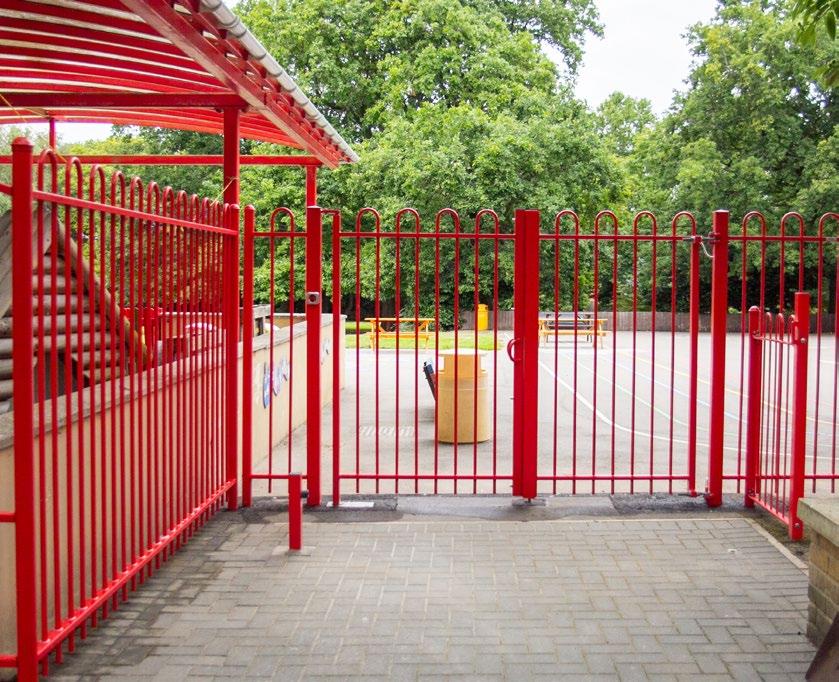







F potential vulnerabilities. These assessments will inform safety plans and help to guide decision-making around physical security and response protocols.
For schools wondering what Martyn’s Law should look like on the ground, the law outlines four types of procedures that must be in
While the requirements are comprehensive, they remain proportionate. Martyn’s Law does not demand that schools undergo specialist terrorism training
place. These include evacuation, where staff move individuals safely out of the building or premises; invacuation, where people are brought into safer internal areas to protect them from external threats; and lockdown, which involves securing the site – particularly classrooms – by locking doors and preventing movement.
The fourth requirement is communication: alerting everyone on site that there is danger. This could involve the use of public address systems, alarms, or other technology that enables swift communication during a crisis. Even in the absence of advanced technology, communication must be timely, clear, and effective under pressure.
Schools that do not have electronically controlled access points are still expected to E


F implement a single integrated procedure for invacuation and lockdown. The emphasis should be on what is practical and appropriate for their specific site – securing classroom doors and managing access routes without necessarily needing to invest in costly infrastructure.
While the requirements are comprehensive, they remain proportionate. Martyn’s Law does not demand that schools undergo specialist terrorism training or complete detailed threat evaluations. Instead, staff must be aware of the safety procedures in place and receive relevant guidance based on their roles. Free continuing professional development (CPD) training is available via ProtectUK, a governmentsupported platform offering resources tailored to schools and other public venues.
The legislation introduces a tiered framework for public venues, determined primarily by capacity: standard tier is for venues with 200–799 capacity and enhanced tier is for over 800 capacity.
However, educational settings are treated differently. Regardless of capacity, all schools fall under the standard tier. This reflects the recognition that schools already operate with robust safeguarding and health and safety procedures.
Therefore, even large-scale schools or academies with over 800 students are not expected to adopt the more stringent enhanced tier requirements. These are reserved for large venues such as concert halls and sporting arenas,

which may be required to employ dedicated security staff, install CCTV systems, and develop more complex operational security plans.
A persistent concern among education leaders has been whether school-hosted events – such as concerts, summer fairs, or sports days with over 800 attendees – might trigger Enhanced Tier responsibilities. However, educational premises are excluded from the definition of “qualifying events.” This means that even if a school event draws a large crowd, it remains covered under Standard Tier requirements. Schools do not need to introduce specialist security or undergo additional event-specific planning as a result of high attendance alone.
Martyn’s Law is rooted in a deeply personal campaign. Named after Martyn Hett, who died in the 2017 Manchester Arena bombing, the law is the result of tireless campaigning by his mother, Figen Murray. In partnership with former counter-terrorism national coordinator Nick Aldworth, she began advocating in 2019 for greater protective measures in public spaces.
Their campaign, which began as a grassroots effort, gathered significant momentum. The original proposals included five central principles: providing free staff training, conducting vulnerability assessments, mitigating identified risks, developing counter-terrorism plans, and promoting local authority planning.
In May 2024, Figen and her fellow campaigners walked from Manchester to London to raise awareness. Their efforts culminated in a meeting with then-Prime Minister Rishi Sunak and opposition leader Keir Starmer, who later became Prime Minister. Within months, Martyn’s Law had passed through Parliament and was signed into law.
Speaking on the day the bill received Royal Assent, Prime Minister Starmer called it a “landmark moment” and praised the courage of campaigners: “Security is the foundation of our Plan for Change and the first duty of any government. Martyn’s Law will ensure everyone can enjoy public events more safely and ensure venues across the country have clear, practical measures in place to protect people.”
Figen Murray added: “Over the implementation period it is vital that the government and Security Industry Authority provide all that is necessary for publicly accessible locations to implement Martyn’s Law.”
Martyn’s Law is not designed to create fear in schools, but rather to embed a culture of preparedness. It reinforces the importance of clear planning, staff readiness, and secure environments – complementing, rather than replacing, the safeguarding principles schools already uphold.
The government says that guidance will be provided “in due course” to assist those responsible to understand the requirements set out in the legislation. M
Find out more about Martyn’s Law here

In a classroom where independence is encouraged from the start, it’s clear when tools are working in harmony with the school’s educational approach. During a recent visit to a classroom, something stood out—not the students’ impressive focus, nor the peaceful atmosphere, but the way technology blended seamlessly into the daily routine. Without prompting, pupils stood, retrieved their Chromebooks from colour-coded charging slots, and returned to work. No tangles, no confusion—just quiet autonomy.
This was no coincidence. It was the result of a school-wide commitment to blended learning and a purposeful switch to PowerGistics charging stations. Designed specifically for ease of access and daily interaction, these compact towers have reshaped the way students and teachers engage with technology. Gone are the cumbersome carts of the past with tangled cables, clunky drawers, and toploading trays that were difficult for younger learners to manage.
By assigning each student a shelf and a device, the system builds accountability while supporting quick, intentional use. Pupils
retrieve and return their devices multiple times per day without disruption, freeing up valuable teaching time and reducing unnecessary screen exposure. It’s not about keeping devices at desks all day—it’s about accessing technology precisely when it adds value.
For staff, the impact is just as meaningful. With PowerGistics, IT teams report far fewer repairs thanks to the protective, lay-flat aluminium shelves that act as natural heat sinks. Device damage from drops, cord tangles, or overheating has significantly declined. Teachers no longer need to manage who’s using what, when, or worry about charging routines. The system supports itself.
“It’s so efficient that I don’t even have to think about it. The pupils handle everything themselves,” one teacher shared.
And while PowerGistics may be an investment, schools say it’s one that pays off, saving time, reducing long-term tech costs, and aligning with modern teaching strategies that prioritise pupil-led learning. The result? Fewer IT headaches, longer-lasting devices, and empowered learners who take responsibility for their own tools.
In short, PowerGistics doesn’t just tick the boxes for charging and storage. It supports a bigger vision: independent learners, supported educators, and smarter tech decisions for schools. M


From a lack of access to broadband and devices, to missing skills to thrive online, digital poverty is affecting education, career opportunities and social mobility. With many classrooms also affected by poor technology infrastructure and connectivity, we examine government initiatives and grassroots efforts to tackle the digital divide
To be unable to keep up with an increasingly digital world is to be digitally excluded. Digital poverty, as defined by the Digital Poverty Alliance is: “the inability to interact with the online world fully, when, where and how an individual needs to.”
Some people are more vulnerable to digital poverty than others, such as lowincome households, who are more likely to struggle to afford broadband and data, disabled people, who are more likely to struggle with accessibility, and young people struggling to find work. These are all compounded when they occur in young people, when the modern education system demands several devices, a stable internet
connection, and digital competency. A failure to access these things will inevitably affect school performance, and potentially affect young people into their careers.
Despite technology being rife and children accessing the internet at younger ages, digital poverty is worryingly common and was exacerbated by the COVID-19 pandemic, which kickstarted a mass shift to digital. One in five children home schooling during the pandemic did not have access to an appropriate device like a laptop. Being digitally excluded has signficant effects on a child’s school performance, who are E


F more likely to be punished for missing online homework, and behind on academic targets. As digital poverty is a socio-economic issue, failing to address it hampers social mobility and prevents bright and applied children from succeeding due to factors they cannot control. This is supported by research that found that 40 per cent of children in middleclass families were able to provide five hours or more of online learning, compared to just 26 per cent of working-class households.
Addressing digital poverty in young people, then, requires several approaches: tackling broadband poverty, equipping children with the correct devices, and ensuring that every child has the necessary skills to navigate the modern world. These principles guided the government’s recent Digital Inclusion Action Plan, which was published in February. The cross-departmental mission to make steps to foster digital inclusion reflects the scale of the problem, with young people at the crux of it: setting young people up safety and confidently to navigate a digital world is a skill for life.
The framework has four focuses: opening up opportunities through skills, tackling device and data poverty, breaking down barriers to digital services, and build confidence. All four of these provide opportunities for the government, local authorities, educational settings, and education providers to collaborate to ensure no child is left behind.
3.8 million people in the UK lack the essential digital skills for life and 7.3 million (18 per cent) lack the minimum essential digital skills for work. Digital exclusion due to a lack of skills is often attributed to elderly people, and although it is true that more than one in three over 65s lack the basic skills to use the internet, research from The King’s Trust found that 37 per cent of young people sampled in the UK did not study a digital or technology-focused subject beyond Key Stage 3, which is concerning.
Digital skills aren’t just crucial for accessing many employment options, but also to participate in the economy and society. The government’s action plan sets a target for everyone across the UK, regardless of their background or circumstances, to have the skills to benefit from the online world in a safe and informed way, which will involve providing training and education, facilitating access to skills support for everyone, and making sure that upskilling enables people to realise the wider benefit of being online.
To achieve this, the government is developing the Industrial Strategy, setting up Skills England, launching the independent Curriculum and Assessment Review, as well as announcing a new growth and skills levy to ensure that every young person leaves school with digital skills, and adults who are without them are able to upskill.
Tackling data and device poverty
The report explains that to get online, an individual needs three things: a broadband

line or mobile signal, a telecoms service, and a device, but not everyone lives within reach of a reliable network, can afford the cost of a monthly service, or a device.
Those living in rural areas have broadband speeds 26 per cent slower than those in urban areas that can make video calls, for example, and a report by Frontier Economics for BT suggests that as many as one million households are likely to be unable to afford connectivity at any price, and may be sacrificing other life essentials (clothing, food) to keep themselves or their children online.
Alongside broadband, a lack of devices can make young people digitally excluded, particularly needing a laptop as well as a smartphone. In 2024, four per cent of UK households did not have a laptop, PC or tablet at home, with a 2023 Nominet survey of young people aged 8-25 finding that 53 per cent of respondents from working class households considered laptops too expensive. Although schools are increasingly providing tablets and laptops, this leaves distancelearning pupils without support, and where devices are supplemented, still fails to address broadband or connectivity issues.
The government has piloted a proof-ofconcept multi-department device donation scheme with the Digital Poverty Alliance to provide re-purposed government laptops for those that need them. The Westminster OpenRoaming initiative is in the process of being rolled out across the borough since February, with a free WiFi connection to

Only 63 per cent of schools responding to the 2023 Technology in Schools Survey said that they have functional WiFi throughout the school
be established throughout Westminster and hopes to expand the network across all of London. In the beginning of July, this was complimented by free laptops issued by the Digital Poverty Alliance.
While digital poverty applies to individuals’ home life, it can also affect entire schools, with only 63 per cent of schools responding to the 2023 Technology in Schools Survey saying that they have functional WiFi throughout the school.
To tackle this, the government is investing £45 million to boost school infrastructure, including £25 million to upgrade wireless networks this year – helping get classrooms online.
Technology in the classroom has several benefits: not only can it accelerate learning, as research by Education Endowment Foundation found, but it builds digital literacy skills in children, complementing the Online Safety Act 2023 which will better protect children online.
This marks the latest phase of funding in this programme which, so far, has connected more than 1.3 million pupils to reliable networks across 3,700 schools. This is separate from an additional £20 million to complete the delivery of fibre upgrades to 833 sites.
New Bridge Multi Academy Trust, a SEND Trust in Oldham and Tameside, has received £250,000 to use technology to remove barriers to learning, with an assistive technology coordinator using 3D printing to adapt access methods for individuals, such as custom-printed joysticks and switches to better navigate iPads.
Richard Bright, executive advisor for technology across New Bridge Multi Academy Trust, said: “Tech gives our young people a voice, and through reliable connectivity we can consistently give them that voice. Tech supports improved attainment and benefits attendance, behaviour and wellbeing.” M
See the Digital Inclusion Action Plan here
Whatever your needs, whether electric, wheelchair-accessible, or both, The Minibus Centre has a solution for you


When it comes to dependable, tailored transport for educational institutions, The Minibus Centre stands out as a trusted partner. With over 20 years of expertise, they have earned a strong reputation for delivering innovative, high-quality minibuses that meet the evolving needs of schools, colleges, and universities across the UK. From nursery outings to sixth-form excursions, The Minibus Centre’s range of customisable vehicles supports schools at every level. Their commitment to safety, comfort, and durability is reflected in every model, each crafted using precision engineering, state-of-the-art technology, and premium materials.
Among their most popular models is FlexiLite™, a lightweight, 17-seater accessible minibus designed with schools in mind. Crucially, it can be driven by anyone with a standard car licence, offering schools maximum flexibility and eliminating the need for specialist drivers. With multiple layout options, the FlexiLite™ adapts to your day-to-day requirements— whether transporting a class, accommodating wheelchair users or both. Accessibility features such as ramps, tail lifts, grab handles and highvisibility aids ensure every pupil, regardless of mobility, travels safely and comfortably.
For schools focused on reducing their carbon footprint, The Minibus Centre also offers electric and hybrid models that carry up to eight passengers—combining environmental responsibility with the practicality and safety schools require.
The Minibus Centre works closely with schools to ensure each minibus meets specific institutional needs. Whether you’re focused on cost-efficiency, long-term durability or inclusive design, their expert team provides tailored advice and support every step of the way.
As Elaine Bannatyne, headteacher at Balfron High School, explains:
“It was clear The Minibus Centre had what we were looking for. As soon as we got in touch, they were insightful and supportive, helping us choose the right model and the right features.”
Douglas Chambers, headteacher at Caledonia Primary School, shares a similar experience:
“Thanks to The Minibus Centre, our students could enjoy a summer outing. These trips are invaluable, providing opportunities to explore new environments, develop social skills, and simply have fun.”
With a wide range of options—including electric vehicles, nine-seaters and wheelchairaccessible models for up to four wheelchairs or 16 passengers—The Minibus Centre offers futurefocused solutions that meet today’s educational demands. M
Find our more here

A collaborative border initiative is making it easier for school groups to visit Europe. The School Travel Forum explains how schools can benefit from the new fast-track border clearance system at the Port of Dover
For decades, school trips to Europe have been a cornerstone of British education, offering students invaluable opportunities to explore different cultures, practice languages, and broaden their horizons beyond the classroom. Yet in recent years, the administrative burden and border complexities have increasingly threatened these vital educational experiences.
Now, a new initiative has been launched at the Port of Dover to restore the ease and accessibility that school travel once enjoyed.
Now, school groups traveling through Dover can benefit from a fast-track border clearance
system, developed through a collaboration between the Port of Dover, UK and French authorities, and participating ferry operators, P&O Ferries and Irish Ferries.
This initiative represents more than just administrative efficiency, it signals a renewed commitment to prioritising educational travel in an increasingly complex post-Brexit landscape.
The challenge behind the solution
The introduction of this new system comes at a critical time for educational travel. Schools have faced mounting challenges in organising European trips, from increased paperwork E

F requirements to unpredictable border delays that can disrupt carefully planned itineraries.
The looming implementation of the European Entry/Exit System (EES) and the European Travel Information and Authorization System (ETIAS) has added further complexity to what was once a straightforward process.
Gill Harvey, chief executive of the School Travel Forum (STF), has been part of the group advocating for solutions to these
challenges. “This initiative demonstrates a real commitment to supporting educational travel and reducing administrative burdens for school groups,” Gill explains.
“With the support of the Department for Education and ABTA, we have been working with our colleagues at the Port of Dover to devise a solution for school groups ahead of the introduction of the new EES and ETIAS systems.” The statistics underscore the importance of this intervention. Educational travel contributes significantly to the UK economy while providing immeasurable value to students’ personal and academic development. Language learning, cultural awareness, and global citizenship skills developed through school trips cannot be replicated in the classroom alone. Yet the increasing complexity of border procedures has led some schools to reconsider or abandon their European travel programmes entirely.
To take advantage of the simple fast-track system, schools planning trips through Dover to Calais with either P&O or Irish Ferries, can now submit passenger information 72 hours prior to their scheduled departure, allowing for prescreening that significantly reduces processing times at French and UK border control points.
To qualify for the scheme, schools must provide documentation confirming their

educational status, such as evidence of registration on national school databases. This verification process ensures the system’s integrity while maintaining its accessibility for legitimate educational institutions. Once approved, schools can submit their passenger manifests in advance, allowing border authorities to process the information ahead of the group’s arrival.
The benefits extend beyond time savings. The advance submission system provides schools with greater certainty about their travel schedules, allowing for more precise planning of journey times, educational activities and accommodation arrangements. For students, it means less time spent in queues and more time enjoying the educational experience.
The success of this initiative lies in its collaborative approach which brings together multiple stakeholders. The Port of Dover, as the UK’s busiest passenger port, has leveraged its unique position to facilitate discussions between UK and French authorities.
The participation of both P&O Ferries and Irish Ferries demonstrates the ferry operators’ commitment to supporting educational travel and providing schools with travel options, ensuring that the benefits of fast-track processing aren’t limited to a single operator.

To take advantage of the simple fast-track system, schools planning trips through Dover to Calais with either P&O or Irish Ferries, can now submit passenger information 72 hours prior to their scheduled departure
This multi-stakeholder approach reflects a growing recognition that complex modern challenges require coordinated solutions. The Department for Education has also published comprehensive guidance to help schools navigate the new process effectively. This step-by-step guidance provides teachers, educational visit co-ordinators and trip organisers with everything they need to take advantage of the swifter processing times.
“We’re pleased to see this very clear guidance published by the Department for Education,” Gill notes. “It is hugely helpful for teachers and school groups. It is a very simple process and will mean school groups will not face lengthy waits when crossing from Dover to Calais.”
The Department for Education’s guidance represents a crucial bridge between policy and practice, translating the technical aspects of the new border arrangement into actionable steps for busy teachers and trip organisers. By providing clear, step-by-step instructions, the Department for Education has removed much of the uncertainty that surrounded the new system’s implementation. This level of practical support demonstrates the government’s commitment to ensuring the initiative’s success.
Gill Harvey is optimistic about the benefits this new arrangement will bring for teachers and students: “We will be monitoring how this pilot scheme works as successful implementation could hopefully pave the way to further improvements.
“Educational travel has often served as a bridge between nations, fostering understanding and cooperation. By prioritising these connections, the Dover initiative sends a powerful message about the value placed on educational exchange.” E

The implementation of this fast-track system comes at a crucial juncture for educational travel. As schools continue to recover from the disruptions of recent years, the restoration of efficient, predictable European travel arrangements provides hope for a resurgence in educational trips.
For education professionals, the message is clear: educational visits are important for schools, students, learning and the economy, and the Dover initiative demonstrates that with sufficient collaboration and commitment, practical solutions can be found to complex regulatory challenges. The success of this initiative could mark a turning point, restoring confidence in European school trips and encouraging more schools to offer these transformative opportunities to more students.
The School Travel Forum and ABTA have demonstrated that collaborative persistent advocacy, combined with practical expertise, can achieve meaningful change even in complex regulatory environments.
Gill urges schools to talk to their school tour provider: “We are grateful for our colleagues at the Department for Education for bringing all partners together. As well as visiting the Department for Education website, your school travel provider will also be able to explain the process to you. The 72-hour advance submission requirement means it is important to plan ahead, but the rewards, in terms of reduced delays and improved travel experiences, make the effort worthwhile.”
The Dover fast-track initiative is a commitment to ensuring that educational travel remains accessible, enjoyable, and transformative for all students. M
FURTHER INFORMATION
www.schooltravelforum.com



This month, the chancellor announced the government’s departmental Spending Review, a major fiscal event that outlines departmental budgets over a multi-year period. This enables the government to define its strategic priorities across the remainder of parliament
Spending reviews generally exclude ‘demanddriven’ areas such as social security payments and pensions. Instead, they focus on expenditure that can be capped or planned through Departmental Expenditure Limits (DELs) – such as education, healthcare, and transport. As a result, spending reviews typically account for around half of total government expenditure.
This makes the Spending Review a significant moment for the education secretary, who would have needed to negotiate and secure funding in line with the Government’s education priorities.
The review has been published against the backdrop of a tight fiscal environment. With the public finances under pressure and wider global challenges, the chancellor is attempting to balance prudence with the urgent need for investment across public services.
Education receives some uplift, with the core schools budget – which makes up around 60 per cent of the Department for Education’s total spend – set to increase by 0.4 per cent in real terms over the next three years. However, most of that growth is concentrated in the first two years, with the final year seeing a slight decline of 0.29 per cent in real terms.
While any real-terms growth in schools funding is positive, rising demand for special educational needs and disabilities (SEND) provision risks absorbing much of this increase.
Adding further pressure, the government has also committed to expanding the eligibility
criteria for free school meals – a policy expected to cost over £400 million. Both policies, while meritorious in isolation, will draw on the core schools budget at a time when many schools are already struggling with financial constraints.
A more pronounced uplift is seen in the capital schools budget, which will increase by 1.3 per cent in real terms by 2028/29 – equivalent to an additional £4.7 billion annually by the end of the period. This funding will support the rebuilding of over 500 schools, reflecting a significant investment in the education estate.
Taken together, the figures suggest that while some areas of education spending will benefit from modest increases, the sector will continue to face significant financial pressures. The extent to which the announced funding can meet rising demand and policy commitments remains to be seen. M
The introduction of VAT on indepedent school fees has incited a whole host of ripple effects, most notably for immigrant students. Michelle Holmes, managing director of Holmes & Partners Ltd, explores the necessity of compliance when indepenent schools are dealing with immigration regulations
What effects did the addition of VAT on independent school fees have?
Since the implementation of VAT on independent school fees, the sector has felt significant repercussions. Approximately 30 schools have closed their doors, unable to sustain operations under the added financial pressure. This policy has pushed many families to seek state education instead, straining public resources and reducing choice. Smaller schools in particular, often those providing crucial local education or serving niche communities, have been disproportionately affected. As closures continue, concerns grow around reduced educational diversity, loss of employment, and diminished opportunities for children who thrive in independent settings.
How can independent schools ensure that they still attract a full and diverse student population following the addition of VAT?
To attract a diverse student population despite VAT on fees, independent schools must address affordability, accessibility, and value. Expanding scholarships, offering flexible payment plans, and providing longterm discounts can ease financial strain. Schools should enhance value through specialised programs, personal development opportunities, and individualised support while fostering international recruitment and engaging underserved communities. Transparent communication about fee benefits and leveraging digital marketing can strengthen

To
attract a
diverse student population despite VAT on fees, independent schools must address affordability, accessibility, and value
appeal. Partnerships with companies, alumni, and other schools can subsidise costs.
What are the challenges around recruitment and how can independent schools ensure they attract and retain good quality teachers and staff?
Recruiting and retaining high-quality teachers in independent schools requires addressing challenges such as financial constraints, workload expectations, and subject shortages. Schools should offer competitive salaries with benefits like bonuses, relocation packages, and CPD opportunities while fostering a supportive culture that values staff contributions. Flexible work arrangements, clear career pathways, and regular recognition can improve retention, along with mental health support and wellness programs. To attract talent, schools should emphasise their unique offerings, partner with training programs, and promote diversity through targeted recruitment. By balancing compensation, development, and work-life balance, schools can ensure long-term success.
How can independent schools ensure they remain compliant with immigration regulations?
To ensure compliance with immigration regulations, independent schools must adopt a robust and proactive approach to managing their responsibilities as licensed sponsors for international students. Staying updated on UKVI policies is crucial, requiring regular monitoring of rule changes and staff training to understand compliance duties. Regular audits of records and mock inspections help identify potential weaknesses. Issuing CAS must be handled responsibly, ensuring students meet all visa requirements and are likely to comply with their conditions. Monitoring attendance and promptly reporting changes in student circumstances, such as withdrawals or changes in study status, is essential for maintaining compliance. Schools must also notify UKVI of changes to their license details, such as address or key personnel updates.

Michelle Holmes is the Managing Director of Holmes & Partners Ltd, an immigration consultancy specialising in the education sector. As an immigrant herself, Michelle has firsthand experience with the immigration routes to the UK and the psychological impact of emigrating.
Fostering a culture of compliance through staff and student education is equally important. Staff should understand their role in supporting compliance, while students should be informed about their visa obligations. Investing in external support, such as immigration specialists or solicitors, can provide valuable expertise, particularly for complex cases. Preparing for UKVI inspections by keeping documentation accessible and responding promptly to requests is also vital. Finally, avoiding common pitfalls, such as data errors in the SMS or delegating CAS issuance to untrained staff, can mitigate risks. By adopting these strategies, independent schools can effectively manage immigration compliance, protect their sponsor license, and support their international students. M

We offer professional immigration and visa services, tailored to your needs Our skilled team can support and advise you along every step of the visa application process, from Student and Graduate Visas to UK Visitor Visa applications and Skilled Worker Visa applications, we are here to help
Holmes & Partners Ltd is regulated to provide immigration advice and services by the Immigration Advice Authority We work with students, parents, schools, businesses, individuals and families, making travel as straightforward as possible for everyone
Sponsor Licence Applications & Management
We are a small company, meaning we can give our clients our undivided attention, working together in close partnership to help them achieve their goals Many of our team have first-hand experience of the immigration process and so understand the legislation, rules and regulations inside out and can empathise on a personal level We know how confusing and stressful it can be when faced with the mountains of complicated forms and paperwork, so why not let us take care of everything for you? With our help you will be able to live, work, study and visit other countries easily and legally
Visa applications and ongoing support Fixed priced


Website: https://holmespartners.co.uk/contact/
Email: enquiries@holmespartners co uk
Phone: 0113 8980360


A recent report from the Public Accounts Committee has assessed the Department for Education’s approach to teacher recruitment and retention – and found that it has significant shortcomings. With growing concerns over workload, pupil behaviour, pay and widening inequalities between schools, what measures does the report recommend to improve teacher recruitment and retention?
A new report from the House of Commons Public Accounts Committee (PAC) has exposed the shortcomings in how the Department for Education (DfE) is responding to England’s teacher recruitment and retention crisis. Its assessment concludes that the DfE lacks a coherent plan, fails to set meaningful targets, and has insufficient evidence to determine which strategies are most effective in keeping teachers in the profession.
Workload remains the number one reason teachers leave the classroom, but the issue of pupil behaviour is becoming increasingly difficult to ignore. According to the inquiry, the proportion of former teachers citing pupil behaviour as a reason for leaving the profession rose dramatically from 32 per cent to 44 per cent in just one year, between 2023 and 2024. The Committee noted that, while the DfE is aware of these challenges, E
F it lacks a deep understanding of the causes. It does not, for example, have reliable insight into where workloads are particularly high or why pupil behaviour is deteriorating in some settings more than others.
To address these problems, the DfE has introduced measures such as Attendance and Behaviour Hubs and a voluntary Staff Wellbeing Charter. However, the PAC pointed out that only 17 per cent of schools and colleges have signed up to the charter, suggesting limited impact and low engagement with this initiative so far. The Committee has recommended that the government urgently consider changes to contractual and working conditions, including offering more flexible working arrangements and implementing serious measures to reduce teacher workload. If Behaviour Hubs prove effective, the PAC advises they be expanded more widely across the country.
The Committee also raised pressing concerns about how the government intends to deliver its pledge, announced in July 2024, to recruit an additional 6,500 teachers across schools and further education colleges over the life of this Parliament. The report criticises the lack of clarity around how this figure was calculated, what it is intended to achieve, and how progress towards meeting it will be tracked. In its evidence to the PAC, the DfE was unable to clearly explain how the additional teachers would be deployed or how this would help address existing subject and regional shortages. Nowhere are these shortages more urgent than in the further education sector. The PAC report highlights that just over one in twenty FE teaching posts were vacant during the 2022–23 academic year – a figure that raises serious concerns given the central role of FE

in delivering skills and training aligned to national priorities. The Committee is calling for the DfE to publish detailed information on how the 6,500-strong teacher recruitment target will address these gaps, and for a comprehensive update on recruitment and retention plans in further education specifically.
Teacher pay also came under scrutiny. While the DfE acknowledges that pay is an important factor in both recruitment and retention, the PAC found little evidence that the Department has seriously assessed the comparative value of increasing salaries versus other interventions. The DfE has invested heavily in professional development, including £131 million in the Early Career Framework in 2024–25, yet it has not compared the impact of this investment with the possible outcomes of a more generous pay structure. The PAC believes the DfE must now assess this properly

The Committee has recommended that the government urgently consider changes to contractual and working conditions, including offering more flexible working arrangements and implementing serious measures to reduce workload
so that future decisions are grounded in evidence and value for money, and so that the government can make a transparent choice about whether to increase teacher pay further.
The report draws attention to sharp disparities in teacher distribution between schools serving the most and least disadvantaged communities. In the most deprived schools, 34 per cent of teachers have less than five years’ experience, compared to just 20 per cent in more affluent areas. These schools also face the greatest difficulties in filling specialist teaching posts. The shortfall is most acute in subjects that are vital for the future economy. For example, Computing has a vacancy rate of 1.4 per cent in disadvantaged areas, compared with 0.8 per cent across secondary schools generally. Access to certain A-level subjects is also severely limited. Thirty one per cent of schools in the most disadvantaged areas do not offer Computer Science at A-level, compared to only 11 per cent in the least disadvantaged, and nine per cent do not offer Physics A-level, compared to just one percent in more affluent areas.
This unequal access to education risks locking young people out of future opportunities – especially in high-demand STEM careers. It also undermines the government’s ambition to “break down barriers to opportunity,” according to the PAC, by entrenching educational inequality.
Commenting on the report, PAC member Sarah Olney MP praised the dedication of teachers across the country but warned that their work is becoming ever more difficult. She noted that while the DfE insists teaching quality is more important than quantity, that argument becomes less convincing when E

F schools are unable to offer certain subjects at all due to staff shortages. Olney stressed that although the PAC does not make policy decisions, it has clearly stated that the government should thoroughly examine how improvements in working conditions, including greater flexibility and higher pay, might offer better value than current approaches.
Sarah Olney said: “The Committee is calling for the government to take a serious look at working conditions, flexible arrangements and increased pay for teachers. It is important to stress that this Committee’s role is not to make recommendations on policy – our report makes clear that government should be exploring conditions and pay as value for money measures alongside the other recruitment and retention initiatives it is carrying out.
“The debate around these issues has a long history, and is far from over. If the recommendations in our report are followed, the government will have an explicit answer, based on its own analysis and evidence, on whether it is time to offer teachers more flexibility, and/or to pay them more.”
The broader message from the PAC is that the teacher workforce is at a tipping point. Without urgent action to address workload, behaviour, flexibility, pay and working conditions, schools and colleges will continue to lose skilled professionals – and students, especially those from disadvantaged communities, will suffer as a result. L
Read the full PAC report here
Clearooms empowers schools, colleges, and universities to streamline room bookings and workspace management with simplicity and security. From intuitive scheduling to secure visitor management, Clearooms supports the education sector in optimising space, enhancing safety, and improving user experience—so staff and students can focus on learning, not logistics.

space solutions for various sectors, including education, healthcare, and offices. Our products are designed to maximise space efficiency and acoustic comfort, ensuring reliable and cost-effective installations across the UK.







